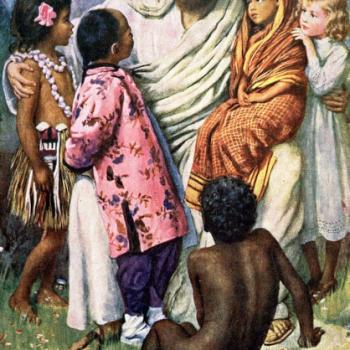False Religion, True Religion series
We speak with a lot of coded messages today. They’re sometimes called dog whistles that stir up people without actually spelling out their ideology. Similarly in political speeches, politicians often address one crowd while their message is meant for an entirely different group such as other nations. We also use puns and double entendres.
Is the word sin a code word for love? No. Then why is he word sin used so often when we’re supposed to spread love? The church at Ephesus gives us a clue.

In an early example of a coded word, Odysseus told the cyclops that his name was “no man.” Odysseus attacked and blinded the beast who yelled for help, saying, “No man is killing me by fraud; no man is killing me by force.” He didn’t get any help. Very clever.
I can write in various computer codes, and have created ways to write secret messages that would be very difficult to decode. My wife says some of my writing must be in code because no on understands it. Sometimes even I can’t decode it.
Communications can be very risky
How do you communicate if the communications may fall into the hands of people who might kill you for what it says? The Apostles during Jesus time, and those in earlier times in Israel, faced this problem.
Jewish authorities, and religious zealots like the Apostle Paul (AKA known at that time as Saul) went around persecuting and even killing those in the new Christian sect. But they weren’t the only major threat.
From around 680 BCE on, Jewish lands were dominated by other kings and cultures. First Babylonian, then others, and then the Greek King, Alexander Great swept through Israel and into Egypt by 331 BCE. His policy was to install a new government, change the culture, and made Greek the official language.
From that time on much of the religious writings were in Greek. It wasn’t safe to speak about the overlords in a bad way, so they wrote things in language symbols and phrases that their occupiers wouldn’t understand. These writings were messages of hope that eventually the occupiers would be defeated.
The Book of Daniel talks about a much earlier time, but was written down during the time of Greek influence. It primarily talks of an end to the occupiers and about a favorite topic the wonderful new world to come.
Apostle John’s writings
Similarly the Apostle John ran into this threat with the Romans, and he was exiled to a remote island (Patmos). Those they regarded as troublemakers and unwanted, the Romans sent to one of three different islands.
John famously was the inspiration behind the Fourth Gospel, the Book of John. It was said by Polycarp, who knew John and some other Apostles, that John brought together Andrew and Apostles to write down what they remembered about Jeus and their time with him.
It isn’t known for sure if the Apostle John wrote the Book of Revelation because there are some theological and language differences from the letters he is known to have written: 1 – 3 John. There were other leaders named John. Whoever wrote Revelations knew what was going on in the churches at that time, which was sixty years after Jesus’ time. The Apostle Paul lived that long.
Problem at the Church at Ephesus
John spoke in code in Revelations to the Ephesus Church: “Your first love.”
To the church at Ephesus the writer said in Revelations 2: 1-6, “I know your deeds, your hard work and your perseverance. I know that you cannot tolerate wicked people, that you have tested those who claim to be apostles but are not, and have found them false. You have persevered and have endured hardships for my name, and have not grown weary.
“Yet I hold this against you: You have forsaken the love you had at first. Consider how far you have fallen! Repent and do the things you did at first. … But you have this in your favor: You hate the practices of the Nicolaitans, which I also hate.”
We know from the text that the problem wasn’t sin. Nor was it the practices of the Nicolaitans which essentially was Gnosticism, that is, religion was about what you know and not about what you do. Parts of Christianity today have that influence of knowing and speaking about Jesus, but when it comes to doing anything for others it’s not a part of their practice. As the Apostle James put it, faith without works is dead (James 2:17). It’s meaningless.
The first love – Jesus’ message
According to John, the Church at Ephesus had abandoned its first love. What would that be? The message Jesus taught and demonstrated about how to live and about the Good News of forgiveness, which is about reconciling with God and living in accordance with and as an example of God’s ways.
The message of Jesus wasn’t just about forgiveness. It was about love and goodwill toward others. John, speaking as a prophet would, asked them to repent – that is to be remorseful and turn back.
Was this about judgement for their “sins?” Nope. It’s important what we do. In fact, we’re not to judge others or we will be judged.
The Apostle Paul said, “God will repay each person according to what they have done. To those who by persistence in doing good seek glory, honor and immortality, he will give eternal life. But for those who are self-seeking and who reject the truth and follow evil, there will be wrath and anger. (…) For God does not show favoritism.” Romans 2:6-11 (NIV)
God looks at what we do.
This is not about judging good deeds versus bad deeds. It’s about a rejection of loving others, and of mistreating them as a consistent pattern in life for which the person is not at all sorry.
Paul said: “For it is not those who hear the law who are righteous in God’s sight, but it is those who obey the law who will be declared righteous. (Indeed, when Gentiles, who do not have the law, do by nature things required by the law, they are a law for themselves, even though they do not have the law. They show that the requirements of the law are written on their hearts, their consciences also bearing witness, and their thoughts sometimes accusing them and at other times even defending them.))” – Romans 2:13-15 (NIV)
The side track to nowhere
Is sin a coded message for love? The church at Ephesus took a side track. Like many churches today they decided their mission was about sin, evil, and judgment, instead of about love and forgiveness. It’s easy to get sidetracked when you see things that you think aren’t right. Yet these behaviors are changed when people experience the love of God as shown through others.
Confronting people about sin pushes them away. Following the ways of God automatically turns people away from hurting others.
False religion
Religion that focuses on hate, sin, evil, and judgement are false religions. They focus on the wrong things. Yes, Jesus did talk some about those things, but he was talking almost always to Jews and trying to help them understand that following the law would not save them, they had to follow the way of love.
Take Home points
God looks at what we do, not what we “know.” The emphasis on sin and apocalyptic that we read in the Bible creates a perspective that the Bible is about hating sin and about the consequences of sin. Yet Jesus tells us that the most important commandments are following God and the love of others.
Jesus was heralded into life not with apocalyptic tones of destruction, but with “Goodwill toward mankind.” He proclaimed the Good News of forgiveness (just for the asking). He showed us how to live: it’s less about what we know and proclaim and mostly about how we treat others.
Jesus associated with many who were considered vile. He ate with them. People in power questioned his validity. He didn’t condemn these sinners, not even the thief on the cross who knew he had done wrong, yet Jesus told him he would be in paradise with him.
Jesus never condemned anyone, not even the hypocritical and misleading (snakes) leaders who he asked how they could escape judgment. He asked us not to judge or we would be judged. Jesus didn’t ask us to go around stomping out sin – ending sin comes from following the ways Jesus showed us.
Tradition has it that when the Apostle John was dying and asked his final words for them, he simply said, “Love one another.”
Be like John and Jesus. Never judge anyone for their behaviors, just love one another.
___________________
Our answer is God. God’s answer is us. Together we make the world better.
- Dorian
I will use some book references for this series, which I recommended reading:
- Tabernacle of Hate by Kerry Nobles – true story of a group that isolated for peaceful living but ended up in cults that advocated violence.
- C Street by Jeff Sharlet – a true cult that thought Jesus was wrong, and influences politicians around the world
- When Religion Becomes Evil by Charles Kimball (5 warning signs)
Series Links
False Religion – True Religion series
Sadducee and Pharisee Corruption
Two churches in Revelations – Ephesus
Two churches in Revelations – Laodicea
Evil done in the name of religion
What Is Meant by Truth? (Worship in Spirit and in Truth)














